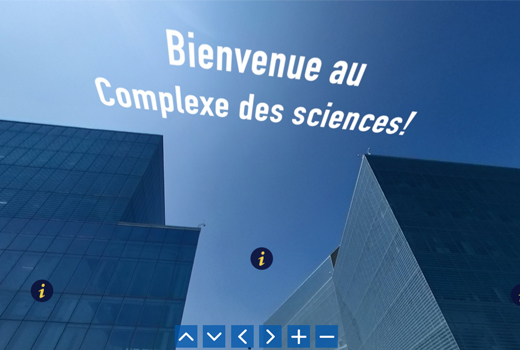Undergraduate programs
Would you like to play a role in protecting the environment and improving people’s health? Help develop new analytical methods and new drugs?
Chemistry is a way to contribute to our social well-being and the country’s industrial growth.
Undergraduate programs in Chemistry at UdeM include a wide range of courses covering all facets of this fascinating discipline, from analytical to inorganic, organic and physical chemistry, along with bioanalytical, bioinorganic, bioorganic and biophysical chemistry.
The Bachelor’s degree in Chemistry leads directly to eligibility as a member of the Ordre des chimistes du Québec (with no admission exam).
Honours Bachelor in Chemistry
The Honours Bachelor in Chemistry offers a sound education, with compulsory courses in all the disciplines of Chemistry: analytical, inorganic, organic and physical.
During your second year, you can choose from three options:
> Environmental Chemistry: understanding the challenges of pollution and climate change from a chemical perspective. Detection of environmental pollutants and development of remediation methods.
> Health Chemistry: design and analysis of molecules for human health. Development of new drugs. Study of chemical processes in living organisms. Bioanalytical methods for detecting compounds.
> Energy and materials Chemistry: understanding the challenges of energy production, storage and conversion from a chemical perspective. Design of materials and alloys for the energy, industrial polymers, nanoscience and nanotechnology sectors.
As modern chemistry becomes increasingly multidisciplinary, traditional boundaries between sub-disciplines tend to blur. So you will hear about kinetics in organic courses, quantum chemistry in inorganic courses, organic chemistry in polymer materials courses and spectroscopy in analytical chemistry courses.
Programs
The Department of Chemistry offers the following undergraduate programs:
- Bachelor in Chemistry (In French)
- Major in Chemistry (In French)
- Minor in Chemistry (In French)
Virtual Visits
In addition to taking you into a laboratory frequented by bachelor students, watch a demonstration of the use of instruments commonly used there.
Take a virtual stroll through the Complexe des sciences (in French) and discover its living, study and learning spaces. From the library to the classrooms and student cafés, you will learn all about the campus!
Learning Guidance
To ensure optimal learning conditions and encourage academic success, each first and second-year course (undergraduate level) is accompanied by a review session, where students can obtain additional explanations and do practical exercises.
Over these 2 years, the groups remain essentially unchanged, to ease the integration of students, group cohesion and teamwork.
Tutoring
Struggling? – Resources are available.
A tutoring service has been set up in the Department to help first-year students struggling to adjust to the pace of university life. If you have any questions, please write to: tutorat@chimie.umontreal.ca.
A team of tutors will get back to you in a timely fashion.
Job Outlook
Chemists play a key role in a wide range of key areas, such as:
- Environment
- Energy
- Pharmaceutical chemistry
- Biotechnology
- Nanosciences and nanotechnology
- Materials
- Computer modelling
Chemists are involved in the synthesis, analysis, modelling and application of molecules and materials in a wide variety of fields, in industry and in public and semi-public organizations.
- Agri-food
- Cosmetics
- Petrochemicals
- Pharmaceuticals
- Metallurgy
- Environmental
- Plastics and rubber
According to the latest survey by the Quebec Ministry of Higher Education, Research and Technology, 52% of graduates with a Bachelor's in Chemistry pursue their studies, while the same proportion (46%) are employed. Of those on the labour market, 92,5% are working full time, most of them in positions related to their degree.
The job outlook for chemists will be attractive in the coming years, in part because of the positive impact of growing public awareness of environmental safety, technological innovations and scientific discoveries.
According to Industry Canada, the Canadian pharmaceutical industry stood 9th in the world in terms of growth since 2015 (annual rate of 4,1%). Moreover, Quebec accounted for 28% of all R&D investment in Canada in 2019, the second best performance of all the provinces.
If you are keen to pursue a career in teaching high school chemistry, you could follow up your bachelor's degree with a Master's in Education, majoring in High School Teaching (in French).

